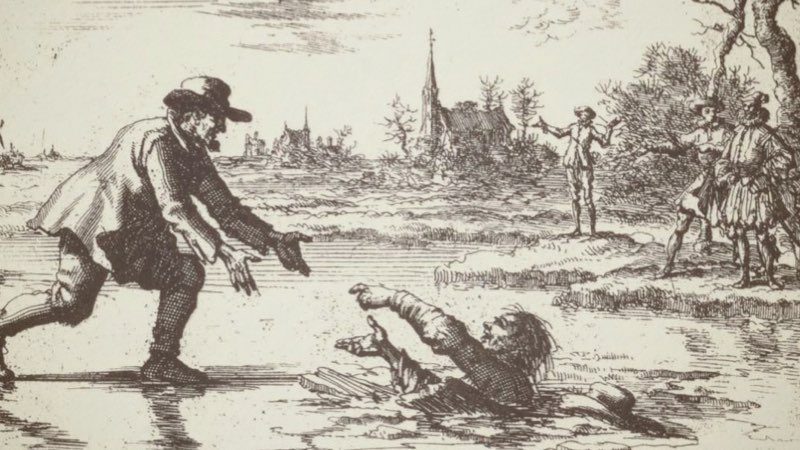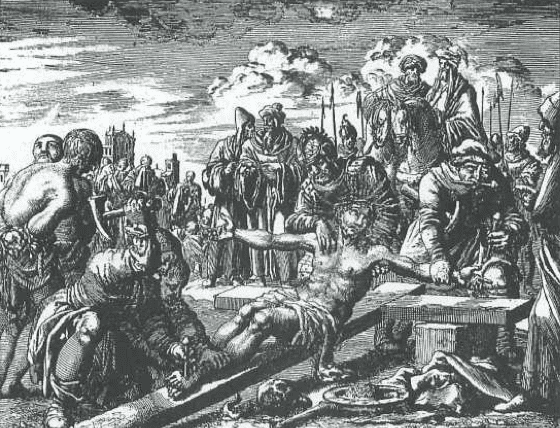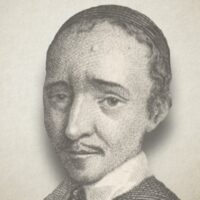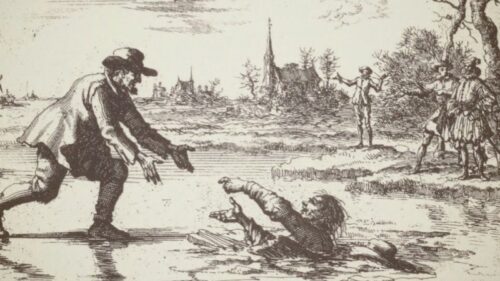
20. The Lord Jesus Christ
Jesus Christ Crucified Outside Jerusalem
Jesus Christ the Son of God Crucified at Jerusalem
About three thousand, nine hundred and seventy years after the creation of the world, in the forty-second year of the reign of Augustus, the second Roman emperor, when the whole world was at peace, Jesus Christ was born of the virgin Mary, in the little town of Bethlehem, being the only and eternal Son of God, the Word by which all things are made, yea, God blessed forever. Matt. 16:16; John 1:14; Rom. 9:5.
But His entrance into this world, as well as His progress and end, was full of misery, distress and affliction, indeed it may be said: He was born under the cross; brought up under the cross! He walked under the cross, and finally died on the cross.
Touching His birth, He was conceived of the Holy Ghost. His birth ushered Him into great poverty; for He was not born in His maternal city, Nazareth, but on the journey to Bethlehem; which was the cause, that no suitable place could be prepared for His birth; yea, even more, He could obtain no place in the inn, but had to be born in a stable; and when He was born, He was wrapped in swaddling clothes, and laid in a manger.
Touching His bringing up, it was attended with much sorrow, for when He was still less than two years old, Herod persecuted Him even unto death; on account of which His foster-father Joseph, and His mother Mary, had to flee into Egypt, and remain there until Herod’s death. But meanwhile there were killed in His stead, that He also might be killed, all the children of two years and under, in and about Bethlehem, so that the voice of lamentation was heard in all the boundaries of that region; of which Jeremiah had prophesied: “A voice was heard in Ramah, lamentation, and bitter weeping; Rachel weeping for her children refused to be comforted for her children, because they were not.” Jr. 31:15; fulfilled, Matt. 2:18.
As regards His life and conversation among men, He was considered an enthusiast and vagrant, because He had no permanent place of abode; which latter was nevertheless thus bitter for Him, that He complains: “Foxes have holes, and birds of the air have nests; but the Son of man hath not where to lay his head” (Luke 9:58). Meanwhile He was reproached as being the friend of publicans and sinners, a glutton and wine bibber, yea, that He was possessed with the devil; and this, until the hour of His departure was nigh at hand.
Concerning the end of His life, it was the most miserable, for it was, so to speak, the day, when all the fountains of the great deep broke forth over Him, and the floods of suffering overflowed Him, to swallow Him up altogether.
First of all, He was betrayed by His disciple Judas, who sold Him for thirty pieces of silver to the high priests and Pharisees. Matt. 26:14-16. Then He was delivered unto them, sharply examined, yea adjured by the living God, to say, whether He was the Christ, the Son of God. And as soon as the Lord had confessed this, they cried, “He is guilty of death.”
Then they spit in His face, and buffeted Him. Others covered His face, saying, “Prophesy unto us, thou Christ, Who is he that smote thee?” (Matt. 27:67,68). This having continued till about morning, they delivered Him to Pontius Pilate, the judge, to pronounce the sentence of death upon Him, and to put an end to His life. Matt. 27:1,2.
Pilate said, “What accusation bring ye against this man?” They answered, “If he were not a malefactor, we would not have delivered him up unto thee.” Pilate said, “Take ye Him, and judge him according to your law;” for he perceived that for envy they had delivered Him. They answered, “He perverts the nation, and forbids to give tribute to Caesar, saying that He Himself is a king. In short, ‘We have a law, and by our law he ought to die, because he made himself the Son of God.’ ” (John 19:7).
Thereupon Pilate took Jesus into the judgment hall, and, having examined Him, said, that he found no cause of death in Him. Therefore he sought a means to release Him; moreover, in order to move the Jews to pity on account of His innocence, he caused Him (though against his conscience) to be terribly scourged, crowned with thorns, mocked, and, thus disfigured, brought before the Jews, saying, “Behold the man!” so that they might now be satisfied with His suffering, and spare His life. But it was of no avail; they cried the more, “Crucify him, crucify him; if thou let this man go, thou art not Caesar’s friend.” Verse 12.
Finally, when Pilate saw that the Jews were not to be moved, and fearing that they might accuse him before Caesar, he went and sat down (at about eight o’clock in the morning, according to our reckoning) in the judgment seat, in the place called Lithostratos, and in Hebrew Gabbatha, a paved elevation in Jerusalem; and there, though quite against his conscience, pronounced the sentence of death upon Christ.
Thereupon the soldiers again very dreadfully mocked Him, laid His cross upon Him, and drove Him out through the gate up to Mount Calvary, where they, after having stripped Him of His garments, nailed Him to a cross, and raised Him up between two murderers, John 19:18; which was done, according to our reckoning, at about nine o’clock in the morning.
In the meantime they gave Him vinegar and gall to drink, parted His garments, and again derided Him most shamefully and above measure, till a great darkness came, continuing for about three hours; and then the Lord cried with a loud voice, “Eli, Eli, lama sabachthani!” that is, “My God, my God, why hast thou forsaken me?” (Matt 27:46).
Then, having fulfilled all, He commended His soul into His Father’s hands, saying, “Father, into thy hands I commend my spirit” (Luke 23:46).
Thereupon He bowed His head and expired, having suffered excruciatingly six hours on the cross, from nine o’clock in the morning till three in the afternoon.
[That the Lord lived six hours, yea, more than six hours on the cross, before He gave up the ghost, appears from the account of Mark, chap. 15; for in verse 25 it says: “And it was the third hour, and they crucified him.” That is according to our reckoning, nine o’clock in the morning. Then, in verse 33, we are told that when the sixth hour was come, there was darkness over the whole land until the ninth hour; which according to our reckoning, was twelve o’clock noon. Then, in verse 34, we read: ”And at the ninth hour Jesus cried with a loud voice, saying, Eloi, Eloi, lama sabachthani, that is, My God, my God, why hast thou forsaken mc?” which, according to our way of reckoning time, is three o’clock in the afternoon. Again in verse 37, we read: “And Jesus cried with a loud voice, and gave up the ghost;” which, as it appears, happened after the expiration of the ninth hour, so that the Lord lived on the cross from nine o’clock in the morning until three o’clock in the afternoon, that is, fully six hours, and not before then did lie give up the ghost, as has been shown from the account of Mark.]Then the earth began to quake, the rocks were rent, the graves were opened, the vail of the temple was rent in twain, and many miracles happened, as a sign that He who died there was more than a common man, yea, that He was the Son of the living God.
This, then, was the end, not of a martyr, but of the Head of all the holy martyrs, through whom they and we all must be saved.
Thieleman J. Van Braght (1625-1664) was an Anabaptist who is best known for writing a history of the Christian witness throughout the centuries entitled “The Bloody Theater or Martyrs Mirror of the Defenseless Christians who baptized only upon confession of faith, and who suffered and died for the testimony of Jesus, their Saviour, from the time of Christ to the year A.D. 1660” (1660).
Thieleman J. Van Braght, Martyrs Mirror





